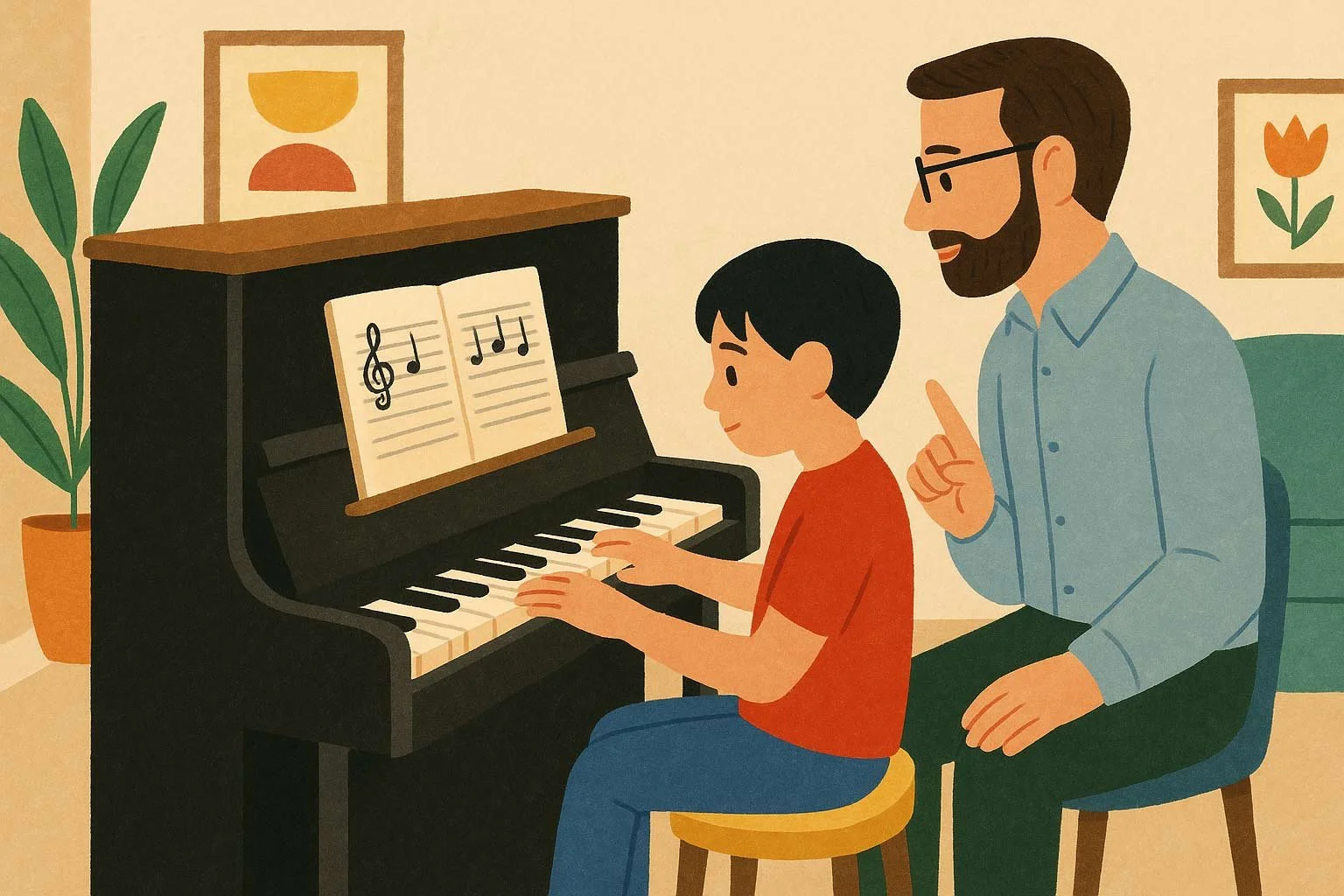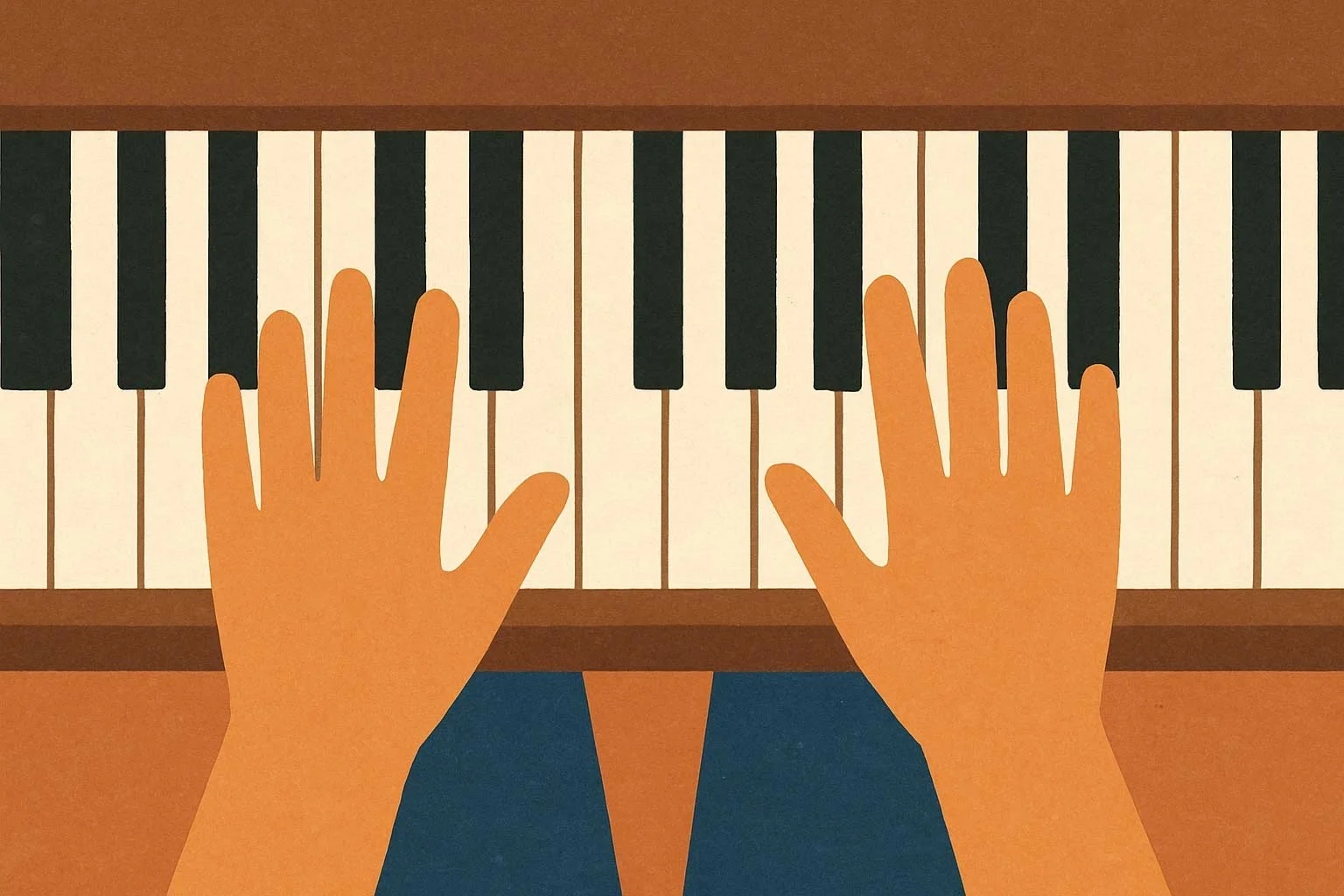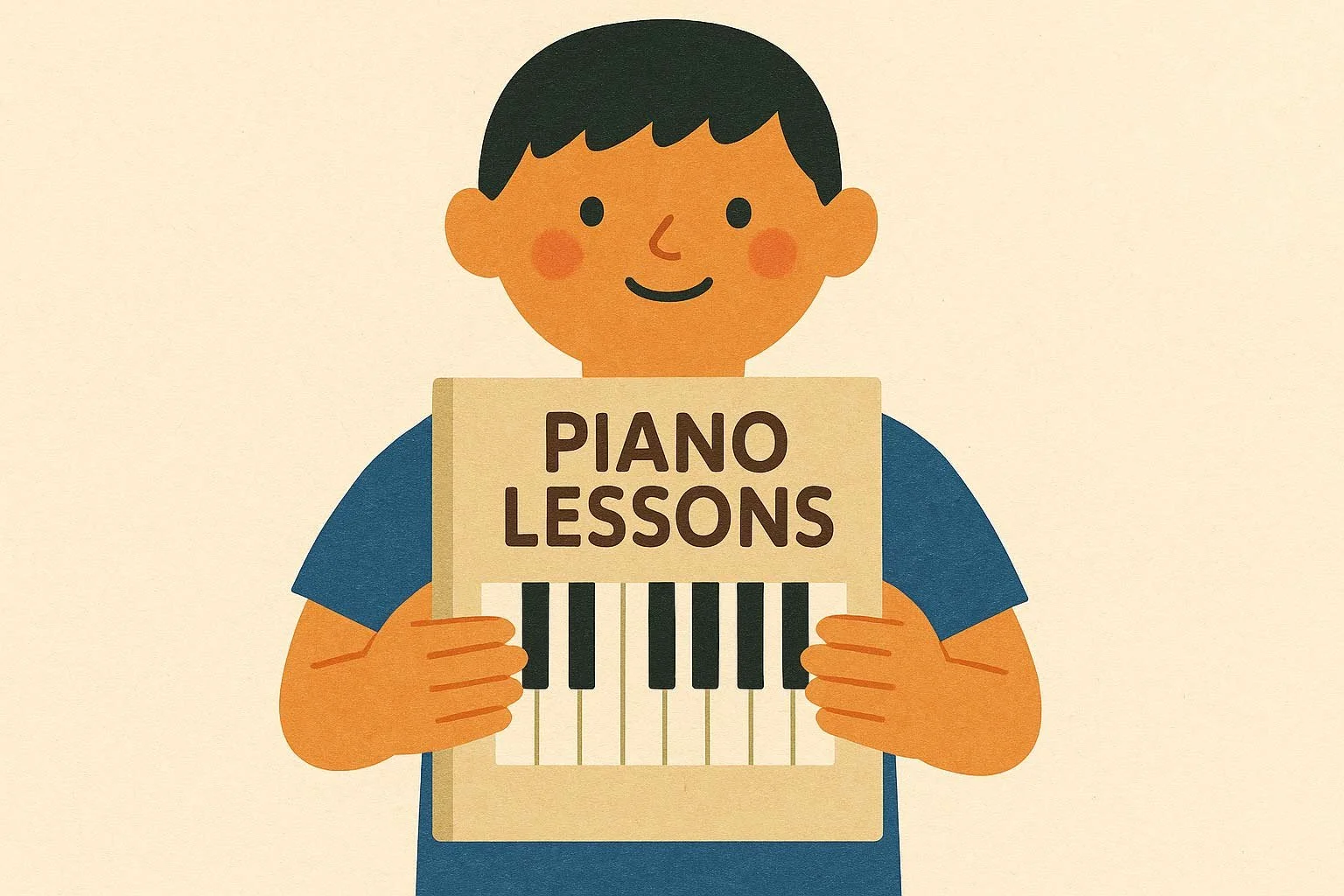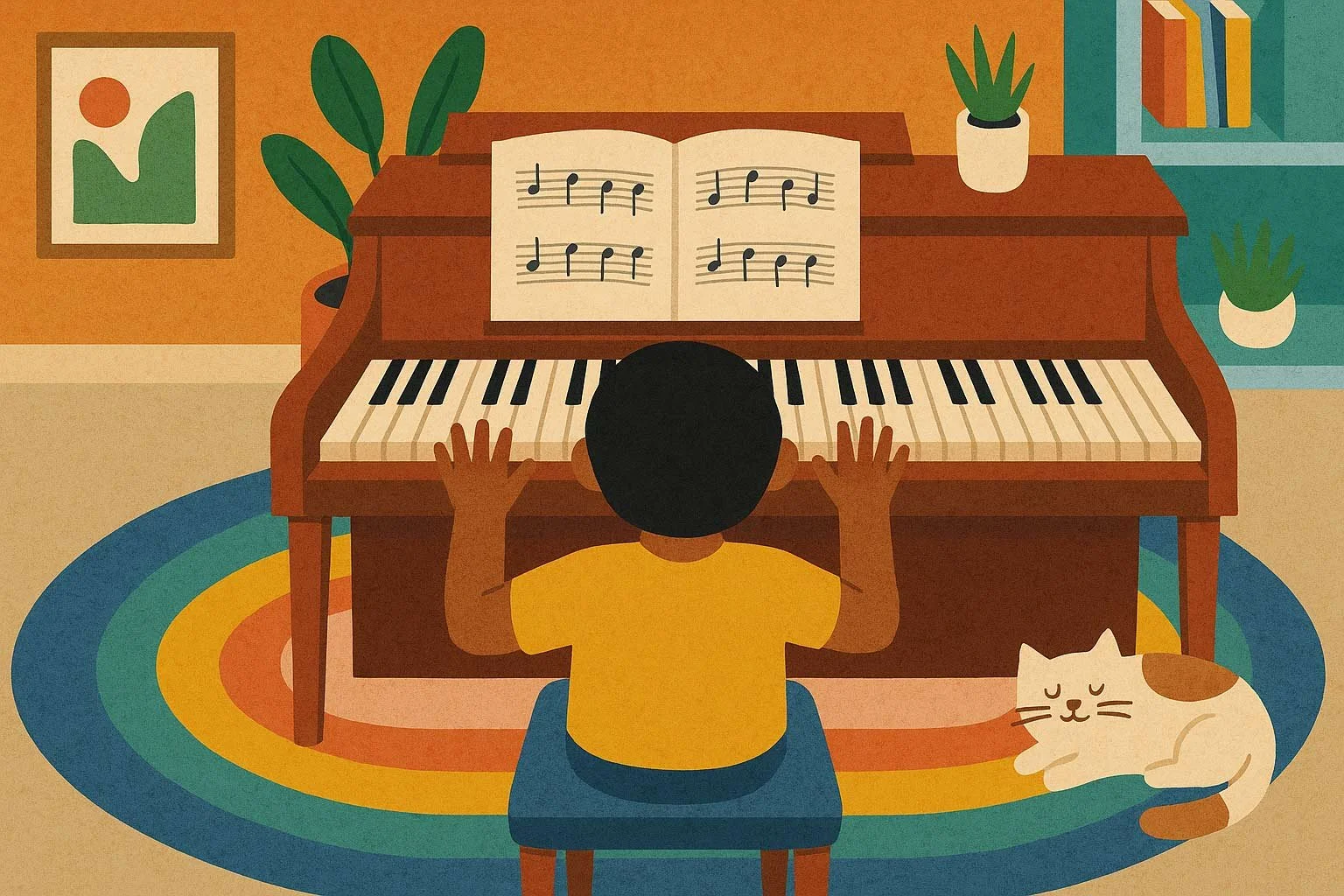The Essential Element For Piano Lessons - FUN
Discover why fun is essential in beginner piano lessons and how it helps your child stay motivated, build skills, and love music. In-home piano lessons in Olathe.
When it comes to beginner piano lessons, many parents wonder how to keep their child motivated and excited about learning. The truth is, fun matters—more than you might expect. Enjoyable, engaging lessons build motivation, nurture creativity, and create a lifelong love of music.
If you're searching for a piano teacher near me in the Olathe or Johnson County area, understanding why fun matters can help you find the right fit and approach for your child.
Why Fun Is the Main Motivation for Kids to Keep Learning
Kids are naturally drawn to activities that are enjoyable. For most young learners, fun is the primary motivation to keep coming back to piano lessons week after week. Without that element of enjoyment, lessons can quickly feel like a chore — making sustained progress much harder.
At Olathe Mobile Piano Lessons, I understand that lasting motivation comes from lessons that are genuinely fun and engaging. That’s why I:
Use musical games to transform what could be a boring part of lessons (like scales) into a fun activity that children enjoy.
Foster a personal connection with each student, creating a supportive and trusting learning environment.
Offer a personalized music curriculum tailored to each child’s interests, whether that’s learning songs from popular video games like Mario, Disney favorites, or exploring creative skills like improvisation and songwriting.
By combining structure with creativity and choice, my lessons not only build solid musical skills but also keep kids excited about learning — making piano a fun part of their life, not a stressful obligation.
Fun Lessons Make Practice Easier and More Effective
Practice is essential to progress, but it can quickly become a source of frustration if it feels like a chore. Fun lessons translate into:
Better Practice Habits: Kids who enjoy lessons tend to practice more consistently, aided by piano practice tips tailored to their interests.
Keeping Kids Engaged: When lessons include fun piano songs and interactive elements, practicing doesn’t feel like work.
Boosting Focus and Brain Development: Enjoyable music learning activities can improve concentration and have multiple benefits of music for brain development.
Why In-Home Piano Lessons Enhance the Fun Factor
When piano lessons come right to your living room, several barriers vanish:
No stressful commutes or packed schedules.
Comfortable, familiar surroundings boost confidence and engagement.
Lessons can flexibly fit around your family's busy life, reducing stress and supporting motivation.
Olathe Mobile Piano Lessons specializes in bringing private piano lessons at home that are tailored to each student’s interests and learning style, making lessons fun and easy to fit into your routine.
If you want your child to thrive musically without added stress, finding a fun-loving and flexible piano teacher can make all the difference. Olathe Mobile Piano Lessons offers personalized, joyful lessons that come right to your home—making music education both accessible and enjoyable for busy families in Olathe, and the Johnson county area.
One-On-One Learning With Piano Lessons
Discover the benefits of personalized, at-your-own-pace piano lessons for kids in Olathe. One-on-one in-home instruction builds confidence, creativity, and lasting musical joy.
The Benefits of One-on-One Piano Lessons Where Kids Can Go at Their Own Pace
Every child learns differently. Some race ahead, while others thrive with extra time, gentle encouragement, and space to explore. That’s why one-on-one piano lessons, especially those designed around a student’s unique pace, can make a world of difference—especially for young beginners.
If you’re a parent in Olathe, or the Johnson County area looking for piano lessons for kids, it’s worth understanding why individualized, flexible instruction helps students not only learn faster, but enjoy it more.
Why Learning at Their Own Pace Matters
In a group class or rigid program, children are often expected to move through material at a fixed rate. But music is a deeply personal journey. When kids feel rushed, confused, or overlooked, their confidence drops and so does their motivation.
With a private, one-on-one setting, a piano teacher can:
Adjust the piano curriculum for children based on progress and interest.
Slow down for tricky concepts like sight reading or rhythm and timing.
Move faster when a child is especially enthusiastic about a topic and picking it up quickly
Going at their own pace builds confidence and creates a more joyful experience for your child—something we emphasize daily at Olathe Mobile Piano Lessons.
The Power of Individualized Attention
One-on-one lessons allow for a deep understanding of each student’s:
Learning style
Interests
Strengths and struggles
Emotional and developmental stage
This opens the door for customized lesson plans that incorporate activities your child loves—whether that’s learning Disney music, video game themes like Mario, or writing their own music
Because our students work one-on-one with a piano instructor in their own home, they get personalized coaching without the distractions or pressure of a group environment.
Boosting Confidence and Growth with Flexible Learning
Learning at your own pace isn’t just more comfortable—it’s also more effective. Here’s why:
Students are more likely to retain concepts like scales and chords when they learn through repetition and play, rather than rushing through a checklist.
Kids can develop a growth mindset in music education, seeing progress as personal and ongoing rather than something to "catch up on."
It’s easier to establish good practice routines for kids when lessons are customized to their attention span and maturity.
One of the most rewarding outcomes of our lessons is watching students gain confidence through music, celebrating their milestones on their own timeline, without comparison or pressure.
How In-Home Lessons Amplify the Benefits
One-on-one lessons at home add an extra layer of comfort and convenience that many families love:
Students can focus better in familiar surroundings.
Parents can easily stay involved in the learning process.
There’s no need to battle traffic or rearrange your schedule.
The teacher comes to you, creating a stress-free experience for everyone.
Olathe Mobile Piano Lessons was built to support busy families who want quality music instruction without sacrificing flexibility. Our approach combines home-based learning with professional guidance and a nurturing learning atmosphere.
If you're looking for piano lessons that respect your child’s pace, encourage their curiosity, and happen right in the comfort of your home, you’re in the right place. At Olathe Mobile Piano Lessons, we meet your child where they are—and help them grow musically with joy, confidence, and creativity.
What Age Should My Child Start Piano Lessons? A Guide for Olathe Parents
Wondering what age your child should begin piano lessons? Learn how to recognize readiness, what skills matter most, and how lessons can be joyful, developmentally appropriate, and stress-free for Olathe families.
If you're a parent in Olathe, KS wondering when to begin piano lessons for your child, you're not alone. It’s a common question, and an important one. Music can be a joyful and enriching part of childhood, but timing matters. So, what’s the best age to start piano?
Let’s explore how to recognize if your child is ready, what early lessons can look like, and how to make the experience both developmentally appropriate and genuinely fun.
How to Know If Your Child Is Ready for Piano Lessons
There’s no “perfect” age, but there is a perfect time: when your child shows signs of emotional, cognitive, and physical readiness. Some signs to look for include:
Interest in music or playing instruments at home
Ability to follow simple instructions
Comfortable sitting for short periods (10–20 minutes)
Fine motor control to press piano keys individually
Enthusiasm for learning through play
For many children, these skills start emerging between ages 5 and 7, but every child is unique.
Key Developmental Milestones to Watch For
Here are a few important areas to consider before starting:
Finger strength and dexterity: Can your child hold a crayon or use small toys?
Focus and attention span: Can they follow directions for 10–15 minutes?
Emotional readiness: Are they comfortable with new adults or routines?
Pre-literacy or counting skills: Basic number and letter recognition helps when learning to read sheet music.
These aren’t requirements, but they give you a sense of whether your child is ready for structured, but fun learning.
Best Ages to Begin: 3–4, 5–6, or 7–9?
Ages 3–4:
Very young children can start exploring music through informal activities—singing, movement, and simple rhythm games. At this age, structured piano lessons may be too soon unless the child is exceptionally ready.
Ages 5–6:
This is the sweet spot for many children. At this age, they’re often developmentally ready for beginner piano lessons, especially with a curriculum designed for music theory for kids, learning through play, and building good practice habits.
Ages 7–9:
Older beginners tend to progress quickly due to increased cognitive and motor skills. They can handle more complex piano lesson structure, sight reading for beginners, and even some piano recital preparation early on.
How Piano Lessons Support Early Childhood Education
Piano isn’t just music, it’s also math, focus, memory, and creativity. Research shows music enhances brain development, boosts confidence, and teaches important habits like perseverance and routine.
Piano also encourages creative expression for children and helps those with ADHD improve focus through structured and enjoyable activities. When designed with motivation for young learners in mind, lessons can nurture a lifelong love of music.
Making Lessons Fit Your Family’s Life in Olathe
Busy parents know how hard it is to juggle soccer, school, dinner, and downtime. That’s why private piano lessons at home are such a game-changer.
In-Home Lessons: A Solution for Busy Parents
No driving, waiting, or shuffling siblings around
Lessons happen in the comfort of your living room
Weekly structure stays consistent
A traveling teacher means no commute needed, ever.
Final Thoughts: Focus on Readiness, Not Rushing
The “best age” to start piano is the one that’s right for your child. Watch for signs of readiness, look for a teacher who specializes in individualized instruction, and aim to make music a fun, low-pressure part of their life.
Starting too early can backfire, but starting when your child is eager and ready can spark a lifelong passion.
Benefits of In-Home Piano Lessons
Discover how in-home piano lessons reduce stress, improve focus, and make music fun for Olathe families. Learn how lessons in your living room build musical skills and confidence in young students.
When it comes to beginner piano lessons, choosing the right environment can make all the difference. For families in Olathe, KS and surrounding areas, in-home piano lessons offer a uniquely effective and low-stress option.
In this article, we’ll explore how lessons that happen right in your living room can lead to better learning, stronger student-teacher relationships, and more consistent progress—all without adding stress to your weekly routine.
1. Less Stress, More Learning
Between school schedules, sports practice, and everyday errands, adding one more thing to your calendar can feel overwhelming. That’s one of the biggest reasons families are turning to in-home lessons.
When a piano teacher comes to you, there’s no driving, no waiting, and no frantic rushing around. For many families, this change alone transforms lessons from a stressful obligation into a welcome, peaceful part of the week.
Young learners tend to arrive at the piano more focused, calm, and ready to play—which means they get more out of each session.
2. A Comfortable, Familiar Learning Space
Learning happens best when children feel safe and supported. For many kids, that means home. A familiar space helps shy or sensitive students open up, ask questions, and take creative risks—important ingredients in building confidence and piano performance skills.
When lessons happen in a consistent home spot, children are better able to develop practice routines and musical habits. A well-organized piano space supports success.
3. Greater Flexibility for Busy Families
One of the biggest perks of in-home piano lessons is how easy they are to fit into real life. You’re not tied to a studio’s schedule. You don’t have to fight traffic. You don’t even have to leave the house.
This flexibility makes it easier to maintain consistent weekly lessons, even when life gets hectic. And for kids, that consistency leads to better focus and long-term progress.
4. Stronger Student-Teacher Connection
When a teacher visits your home every week, something special happens. The relationship isn’t just transactional, it becomes personal.
At Olathe Mobile Piano Lessons, each session starts with a quick check-in: “How are you feeling today?” “What was your favorite part of the week?” These small moments build trust and motivation.
A strong connection also means better learning. Kids are more likely to stay engaged and confident, even when the music gets challenging.
6. Consistent Practice Habits at Home
Because your child is learning right where the piano lives, it becomes easier to build practice into your routine.
There’s no disconnect between “lesson place” and “practice place.” That leads to better piano practice tips taking root, stronger finger exercises, and a natural rhythm of learning.
You’ll also be able to:
See what your child is working on
Help with accountability (without pressure)
Support their progress between lessons
7. Supporting Your Child’s Musical Growth in Olathe
In-home piano lessons offer more than convenience—they nurture your child’s long-term growth.
By removing logistical stress and focusing on individualized instruction, lessons at home help kids build confidence, creativity, and musical skills that last a lifetime.
Families in Olathe are discovering just how joyful and sustainable music education can be when it fits within real life.
If your child is showing signs they’re ready for music—humming tunes, tapping rhythms, or asking to play—consider how in-home piano lessons could support their journey.
For families in Olathe and nearby communities, it’s never been easier to combine high-quality instruction with the rhythms of everyday life.
5 Mistakes to Avoid When Starting Piano Lessons
Starting piano lessons for your child? Discover five common mistakes parents make—and how to avoid them. A must-read for Olathe families starting beginner piano lessons at home.
Starting beginner piano lessons can be an exciting and rewarding step in your child’s development. But without the right guidance, it’s easy to make choices that can lead to frustration, wasted time, or even giving up on music altogether.
If you're a parent in Olathe or Johnson County exploring private piano lessons at home, this guide will help you sidestep the most common mistakes—so your child starts off strong, happy, and motivated.
1. Buying an Expensive Piano Too Soon
When parents decide to start lessons, their first instinct is often to buy a beautiful acoustic piano or high-end digital model. But the truth is, your child might not take to the instrument—or stick with it long enough to justify the cost.
What to do instead:
Start with a low cost digital keyboard. It's easy to move, does not need to be tuned and gives your child everything they need to start learning the basics.
2. Starting at the Wrong Age
The question of the best age to start piano is one of the most common among Olathe parents. While it's tempting to start as early as possible, lessons that begin before a child is developmentally ready can lead to frustration—for both child and parent.
What to do instead:
Most kids thrive when they start between ages 5–10. Look for signs like interest in music, ability to focus for 15–20 minutes, and basic fine motor coordination. A good teacher will offer lessons that feel like learning through play, using tools like music games for kids and fun piano songs to make early lessons joyful and age-appropriate.
3. Choosing the Wrong Teacher
Not every “piano teacher near me” is a great match for a young beginner. A teacher who doesn’t understand music learning styles, or how to engage children can turn lessons into a chore instead of a joy.
What to do instead:
Look for a teacher who offers individualized music instruction, uses a blend of creativity and structure, and is great with kids. For families in Olathe, a traveling music teacher can be a huge benefit, allowing kids to learn comfortably at home, with a teacher who understands how to build trust, and engagement.
4. Turning Practice Into a Power Struggle
Parents often feel unsure about how to encourage practice—and sometimes that turns into nagging or pressure. This backfires quickly. The piano becomes a source of stress instead of joy.
What to do instead:
Create a low-pressure, supportive practice environment. Use practice routine for kids tools like timers, stickers, short-term goals, or music apps. Work with your teacher to create a plan that balances structure with flexibility, while helping you support your child’s learning without overwhelming them.
5. Expecting Fast Results
Piano is a long game. Learning how to play piano, how to read sheet music, or how to understand scales and chords takes time—especially for young children. Progress isn’t always linear, and that’s okay.
What to do instead:
Focus on having fun and building a love for music first. Choose a teacher who helps students set small goals and celebrate every win. Growth comes from steady effort and the joy of creative expression.
Final Thoughts: Set the Stage for a Great Start
Piano lessons can be a meaningful, confidence-building experience—but only when they’re set up with realistic expectations and thoughtful support. By avoiding these five common mistakes, you’re giving your child the best chance to thrive musically—while keeping your weekly schedule peaceful and manageable.
If you’re just starting your journey into piano lessons here in Olathe, remember: A supportive environment, a developmentally appropriate pace, and a caring teacher will do more for your child than any expensive equipment or rigid schedule.
How to Get Your Child to Practice Piano (Without Nagging)
Tired of nagging your child to practice piano? Discover proven strategies that help young learners build habits—without power struggles. A must-read for Olathe parents.
You’ve signed your child up for beginner piano lessons. The books are on the shelf, the keyboard is ready, and their piano teacher is kind and encouraging. But every time you say, “It’s time to practice,” it feels like you’re starting a war.
Sound familiar?
You're not alone—and the good news is, nagging isn’t the only way to build a strong practice habit. With the right environment, mindset, and tools, practicing can feel less like a chore and more like a natural part of your child's day.
Here’s how parents in Olathe and nearby areas can support piano practice without stress or battles.
1. Build a Consistent, Low-Pressure Routine
Kids thrive with rhythm—and not just musical rhythm. Creating a regular practice routine for kids, especially if it's part of their existing daily structure, takes the emotion out of the process. It becomes “just what we do,” like brushing teeth or packing a backpack.
Try this:
Set a short, predictable time each day (even just 10 minutes). Practice before screen time, or right after a snack. Keep it light—especially early on.
2. Let Them Feel in Control
Kids are much more likely to participate when they feel a sense of ownership. Instead of telling them what to practice, give them choices:
“Do you want to start with the music game or your song today?”
“Do you want to play your new piece first or warm up with scales and chords?”
Why it works:
This aligns with student-led learning styles and helps avoid power struggles. Letting kids make small choices builds autonomy and keeps them engaged and motivated.
3. For the Youngest Students (Ages 5–7), Practicing Together with a Parent Can Be a Game Changer
For children just starting out, especially ages 5 to 7, parent participation in practice sessions can make a huge difference. Sitting together at the piano or keyboard turns practice into a shared, positive experience and helps the child feel supported and encouraged.
This approach not only keeps the practice fun but also builds emotional connection and can help improve focus, especially for younger learners who benefit from hands-on support.
4. Have the Student Be the Teacher to the Parent
One creative way to boost motivation and deepen learning is to have your child take on the role of the teacher during practice time. When kids explain or demonstrate what they’ve learned to you, it reinforces their understanding and gives them a sense of pride and responsibility.
How to try this:
Ask your child to show you a new song or skill they worked on.
Let them “teach” you the rhythm or a finger exercise.
let them show you some of the music games they have learned in lessons
This role reversal not only makes practice more interactive and fun but also builds your child’s confidence and communication skills. It transforms practice from a chore into a shared experience.
5. Let the Teacher Be the “Coach”
You don’t have to do it all. One of the best ways to reduce stress around practice is to let your child’s piano teacher set goals, expectations, and encouragement—while you stay in a supportive role. When kids feel like they’re showing up for someone who believes in them, they’re more likely to stay consistent.
Your role as the parent:
Create a calm, consistent practice environment
Help set a regular time in the day
Offer encouragement, but leave the corrections to the teacher
At Olathe Mobile Piano Lessons, I’ve found that friendly competition can be a powerful motivator—without adding pressure. I run a practice competition among students to boost motivation and accountability. Kids track their minutes of practice and earn points, which gives them a tangible reason to stay consistent.
These competitions also make practice more social—even in a one-on-one, in-home setting. Students know they’re not the only ones putting in effort each week, and that sense of connection often leads to better focus and long-term engagement.
Final Thoughts: Support Without Stress
Helping your child build good practice habits doesn’t have to be a battle. By creating structure, offering choices, celebrating progress, and working as a team with your teacher, you can help your child develop a long-lasting love for music—without the nagging.
If you're based in Olathe or Johnson County and you're looking for private piano lessons at home that balance structure with fun, make sure your teacher includes relationship-building and flexible strategies like these. The right learning environment makes all the difference.





